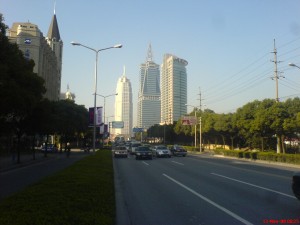
I reached my hotel and checked in. It was in Pudong district in a commercial area. After taking some rest I decided to go out to have dinner, though it was dark and quiet outside. Strolled around for a bit and then entered a restaurant. There were not many customers around. Can I have some chips please? I was craving for potatoes. I love potatoes but Chinese are not so much fan of this vegetable. Waiter looked at me and then walked back inside to get someone else, she didn’t understand English. I tried to explain the same to the ‘other’ person; no luck. Chips, fries, potatoes, patatus, batatus, aaloo – nothing seemed to be working! I gave up and resolved to accept whatever they offer me. Eventually the waitress brought something ‘vegetable looking’ with rice. Not many people speak English here and even Chinglish is missing. Ordering food is a big nightmare. The name of a dish tells you nothing, for example “Donkey rolling on the ground”, is the name of a popular snack among Chinese Muslims.
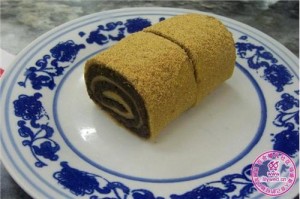
There are many similarities with Pakistan e.g. people will throw litter anywhere (less than Pakistan though), no queuing, speaking loudly, bargaining, corruption, etc. I have even seen people selling train tickets in black outside train station. So corruption does exist here. But the difference is that rulers are largely sincere to their nation (with some exceptions). Former voice Mayor of Beijing was found guilty of corruption relating Olympics; they sentenced him to death, full stop. Two more mayors, Xu Maiyong of Hangzhou city and Jiang Renjie vice mayor of Suzhou city were hanged due to corruption in state funds, property and contracts. Wish it was in Pakistan.
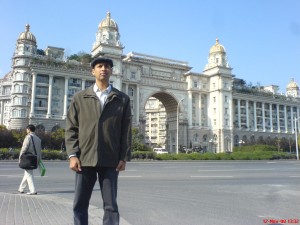
You will see very few children because China follows one child policy strictly. But as a result, they have few young and lots of ageing budhay (old). Now government is relaxing this policy and allowing educated people like engineers & doctors to have two children. Rarely a Chinese has a brother or sister, they don’t know how much they are missing on a brother or sister’s love.
Chinese like doing things laboriously, i.e. the most difficult way possible. Take for example when telling someone a number 9, they won’t use nine fingers; rather make a complex gesture (see below).
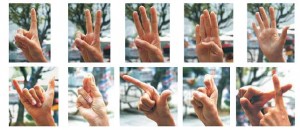
Talking numbers, Chinese had great interest in mathematics since ages and have quite a few inventions in this field. Such as quadratic equation (uh I hate this, referring to equations not Chinese). But strangely they missed out on ‘zero’. While writing numbers they would leave its place blank showing symbolically a zero value.
I found weighing in China a complex affair too. Opposite to a normal scale with two plates, street vendors use this complex looking weighing device in which item is placed in the only plate and then hanging weight is slid back & forth. I couldn’t figure out how we figure out what the item weighs.

Anyway, I came out of my hotel next morning ready to go to work. My Italian & Chinese colleagues were waiting. I was shocked as soon as I came out of hotel. The vast 4 lane roads which were empty last night, were full of cars, buses and an array of endless bicycles & motorcycles; too many to count. It was almost impossible to cross the road. Using my Pakistani expertise I crossed the road carefully. It was much more difficult for the Romeo (let’s call my Italian colleague Romeo; he accompanied me everywhere I visited in China). It was first time for him to be in any Asian country, or more precisely outside Europe. Many more shocks were waiting for him!
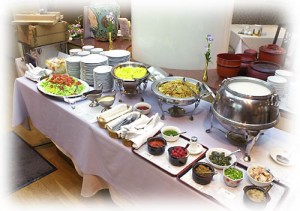
We reached our office, dropped our bags and left with the rest of colleagues for breakfast. It was normal for Chinese workers to check into work and then go to office canteen for subsidised breakfast. Chinese office workers tend to work like army; all arrive together, lunch together and leave together. Soon we were standing in a long queue, picking buffet food items from trays. All the things were different from what I was used to – no bread, no milk or yoghurt, no wheat cereals. Instead there was rice porridge, pickled vegetables, dumplings, dim sums, duck eggs and fried buns (one similar to paratha bread became my favourite!). My Chinese colleague Chan (fictitious name) helped me to choose. Chan was my saviour throughout. He accompanied us everywhere and acted as an escort, especially for food. The shock for me was, there was no tea or coffee, and even bigger one, there were no spoons or forks; only chop sticks – aaaah. I bought tea bags, milk powder and started making my own tea, but chop sticks??? Even to eat rice? How did I cope? I will tell you later.
To be continued.. Read Next Part Here
I also read the “chalte ho to chine ko chalye”, and now reading “Jo chaly china ko..” 🙂
Well nice writing and i always love to read “safar nama”.. 🙂 and safar (travel) as well..
wonderful Kashif..:)
Kashif Bhai, what would be the scene when you were trying to eat rice with chop sticks???????????
I’m keenly waiting for next episode……….
Ming….. Fictitious 🙂
I love their justice in money laundering, bravo! Man steals due to greed & death goes to show how the thing he stole cannot grant him anything; not even a few more seconds of life!
Waiting for next chapter to arrive.
it’s strange that you didnt accompany some spoons and forks.
Happy to hear that chinese are similar to us some extent in queuing, speaking loudly, bargaining, corruption, etc.